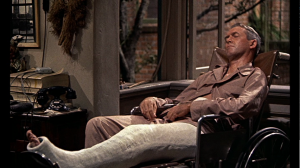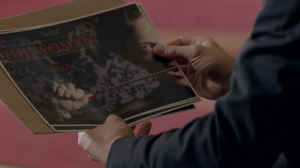Religion obscures Blomkvist’s search for truth by acting as an uncrackable, cryptic code due to his disassociation with religion. By encountering faith in such negative ways, he becomes inclined to distrust religion, illustrating the controversy that it causes in Blomkvist’s universe. When he seeks out the Vanger’s pastor during Harriet’s lifetime, Otto Falk, he is confronted with messages from the mentally-decaying old priest, of which Blomkvist is unable to decipher the meanings. Falk speaks of the “sola scriptura,” the “sufficientia scriptura,” and the “sola fide,” all of which refer to Catholic scriptures and Catholic faith. “Blomkvist [understands] nothing of this”(442), further revealing his lack of religious knowledge. These scriptures outline the necessary steps to gaining sola fide, or the single faith: Christianity. The fact that Blomkvist is completely lost when these scriptures are mentioned illustrates his disassociation from the Christian faith and how it gives him an outside perspective of the religion and its practicers while acting as a barrier that restrains him from knowing more. All of these religious references overwhelm Blomkvist, who does not understand the pastor’s words until Strandh explains them to him. Blomkvist encounters a similar situation when the mystery Harriet’s journal is solved by his daughter. To Blomkvist, the seemingly random assortment of names and numbers is almost impossible to crack; when his daughter solves the puzzle for him by revealing that they were all passages from the bible, Blomkvist is able to make an “intuitive leap”(347) that allows him to analyze the murder cases with more clues in his pocket. It is obvious that all the recent contact Blomkvist has had with religion has changed his mentality as a reporter and an investigator, but it is possible that he assigns too much fault to religion. When Salander she tells him that she thinks he’s “wrong” and that it’s not just an “insane serial killer who read his bible wrong”(418), it exposes the possibility that Blomkvist is been caught up in an illusion that Christianity is to blame, assigning meaning when there is none. His searching for conclusions rooted in christianity is an example of religion’s obscuring properties; he believes that religion is the basis of the murders even when the evidence does not necessarily fit. Salander’s clear interpretation of the murders as committed by someone “who hates women” makes Blomkvist reconsider his stance by making religion seem less important than it had been, previously. It still, however, proves that Blomkvist is influenced negatively by religion due to its obscuring of Blomkvist’s search for answers.
Author: Sandra Bullock
Life Lemons to Detective Lemonade
Although Mars and Jeffries are both capable observers and detectives, they are both hindered by disabilities; for Mars, her social isolation and unlucky position as the daughter of a publicly shamed shamed ex-police chief act as hinderances in her pursuit of truth (namely her pursuit for the case of her missing mother the death of her best friend). Jeffries has the obvious physical obstacle of his broken leg. The two protagonists, however, are not entirely hindered and their supposed weaknesses are, in fact, advantages that allow them to better fulfill their duties as observers and detectives.
Jeffries broke his leg during a photography job at a racetrack and, because of his injury, he is required to wear a waist-down cast extending down his left leg. This physical representation of Jeffries’ immobility not only causes him to be incapable of leaving his perpetual position next to his rear window, it causes him to form an addiction to observing the goings-on of his neighbors. This addiction causes the serving of justice to a deserving criminal and the reignition of his passion towards Lisa, his girlfriend. He is ultimately better off due, transitively, to his broken leg.


Mars is seen as an outsider due to her fall-from-grace from the top of the social hierarchy. Not only is she an social leper, she is an outcast in her own city due to her involuntary position as the daughter of the disgraced ex-police chief. Her identity as an outcast allows her to act as a third party observer to the goings-on of the town, giving Mars an advantage and allowing her to be a better detective. This behavior manifests itself when Mars cuts Willis down from the flag pole, completely disregarding social restrictions about interacting with the publicly humiliated teen. That, coupled with her ability to trust no one due to her belittling at the hand of her father’s replacement for her unsolved rape causes her to become a more cold hearted detective, concerned only with her pursuit of justice. The use of her father’s loyal followers to accomplish tasks is another added windfall of her relation to the ex-police chief, such as the fire chief’s cooperation in Mars’ VHS replacement operation.
Not only are Jeffries and Mars’ detective abilities improved by their disadvantages, the products of their past that supposedly act as obstacles actually place the two in better positions to accomplish solid detective work.
Dominatrix or Domina-tricks?
Irene’s new identity as a dominatrix in the BBC’s “Sherlock” is an unneeded aspect of her character, causing her to seem weaker than her counterpart in Doyle’s original rendition. In the book, Irene is portrayed as a kind hearted, beautiful actress with an affinity for creating scandals;this image of Irene is juxtaposed against the overly masculine, overly power-wielding Irene we get from the show. Although it can be inferred that Irene is more masculine than most women in the book, Doyle offers it as subtext when calling her “the woman”(1), having her dress like a man, and having her wit match that of a man. This masculine trait is supposed to be in the subtext because Irene needs to be a formidable opponent to Holmes while still remaining feminine, proving that women can outsmart men. In the show, however, the inflation of Irene’s masculine identity only causes her to seem more transparent and superficial, causing her to seem like less of a challenge.
In the book, it is Irene’s deceiving kindness and appearance which make her seem to be an unlikely match for Holmes, yet she proves that the previous assessment of her is a fallacy through wit and trickery. In the show, when we see Irene, she is a dominatrix, an obvious antagonist for Holmes due to her relationship with power and and obviously masculine female; this leaves no need for her to prove her abilities because she is presented as Holmes’ nemesis from the get go. We can already tell that she is a match for him wit-wise and we know she leans towards the side of evil, so there is nothing else to discover about her character. In the novel, her true nature lies under the surface, causing her to appear to be an unpredictable character and, thus, an even more formidable match for Holmes.
2
“Spade was immobile in his chair until the fat man, with a flourish and a bow and a jocular ‘Ah, sir, this kind of medicine will never hurt you!’ had handed him his refilled glass. Then Spade rose and stood close to the fat man, looking down at him, and Spade’s eyes were hard and bright. He raised his glass. His voice was deliberate, challenging: ‘Here’s to plain speaking and clear understanding.’”(108-109)
The dichotomy of Spade and the fat man’s behavior towards each other creates a greater understanding of Spade’s true self; he is almost always in control of his surroundings. Although it could be said that, in his interactions with the fat man, Spade is not in control of the situation, but the truth of the matter is that Spade is so far in his element that he was able to control the outcome of this encounter. Spade’s “hard and bright” eyes, in contrast to the fat man’s “caution”(108) filled eyes, give away the fact that he is the one with the upper hand, even if the fat man has the information that Spade desires. His “deliberate” and “challenging” toast is one example of how he is able to hold the power when confronted with a strange environment and someone of whom he has no prior knowledge. When Spade smashes the glass out of anger later on in the conversation, he seems to have forfeited his authority; this is not true, as he reveals his bluff in the elevator while leaving. Spade created this ruse in order to fool the fat man into believing that he (the fat man) had control, further demonstrating his mastery of everything around him. As a detective, Spade must always have a firm grasp on his surroundings and even the smallest slip up could throw a case astray; Spade’s ability to make cold, calculated decisions in times where he is not in control initially gives him the capability of turning any interaction seemingly weighted against him into a an ideal situation for him. It is this power that makes Spade a good detective; if he were not able to take charge in unsavory situations, then he would not have made it past Joel Cairo’s attempt to rob him. His command of his surroundings are the reason why he always comes out on top, because he does not allow anyone to dominate him.
“Effie Perine sat up straight and said, ‘Sam, if that girl’s in trouble and you let her down, or take advantage of it to bleed her, I’ll never forgive you, never have any respect for you, as long as I live.’ Spade smiled unnaturally. Then he frowned. The frown was unnatural.”(42)
Spade’s reaction to Effie’s statement is very revealing of the way he uses facial expressions as instruments to mask his true intentions in social situations and to manipulate others through their subconscious reactions. His unnatural smile at the mention of bleeding O’Shaughnessy is meant to invoke a feeling of sincerity and honesty while covering his actual intention, to acquire as much money as possible from this case. He does something similar when he first meets O’Shaughnessy for the first time. As she speaks, he is supposedly “integrating smiles and nods”(7) in order to give her a sense of “assurance.” In both instances, Spade is using fake smiles to convey a sense of honesty. Spade hides his intentions through his facial expressions, such as when he is speaking to O’shaughnessy in her apartment. When it says that “the upper part of his face frowned. The lower part smiled,”(33) Spade is trying to hide his feelings from O’shaughnessy because he doesn’t want her to know how he feels about her or the case. His creation of such an unreadable facial expression is a clear indicator of his unwillingness to reveal even the smallest iota of his inner workings; he does not want to express a positive or negative emotion that would give his thoughts away, thus his fusion of both a “frown” and a “smile.” Spade’s smile is a finely crafted instrument that allows him to mask his true emotions, allows him to invoke false feelings of confidence in others, and allows him to hide his intentions from anyone who would stand in his way. Spade is an accomplished detective and he uses all tools at his disposal, including ones that allow him to both gather information from others and keep others from gaining information about him.
